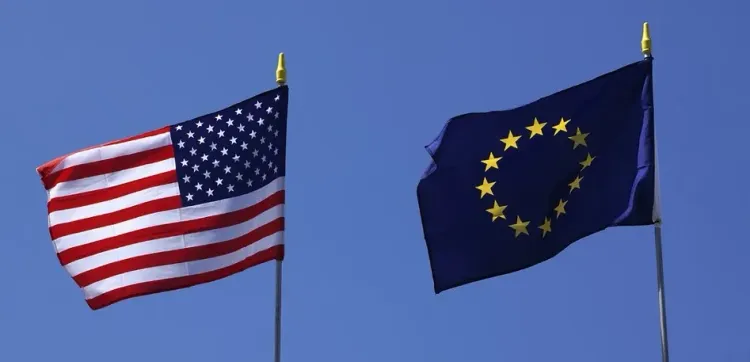Why are Europeans distancing themselves from the US?

Synopsis
Key Takeaways
- Rising anti-American sentiment is influencing travel choices.
- Projected tourism decline of 8.7% in 2025.
- Growing boycott of US brands among European consumers.
- Social media movements are promoting European-made products.
- US could face a loss of $90 billion in tourism revenue.
London, June 7 (NationPress) While standing in line outside Rome's renowned Gallery Borghese with his family, Polish traveler Antoni Furman expressed why the United States is never on his travel itinerary. "Europe offers a lot less congestion, and the US tariffs on the European Union take a toll on our finances," he explained.
Furman embodies a rising trend among Europeans who are choosing to distance themselves from the United States. A surge of anti-American sentiment is sweeping through the continent as US policies strain the transatlantic alliance, affecting daily decisions—from vacation plans to shopping habits, as reported by Xinhua news agency.
Inbound travel to the US is forecasted to drop by 8.7 percent in 2025, with the steepest declines anticipated from Canada and Western Europe, according to Oxford Economics.
Statistics from the US National Travel and Tourism Office indicate that overseas trips decreased by 11.6 percent in March 2025 compared to the previous year. Visits from Western Europe fell sharply by 17.2 percent, with Germany, Spain, and Ireland each experiencing declines exceeding 20 percent. In contrast, the United Kingdom and France saw reductions of around 10 percent.
Travel booking service Omio noted a 16 percent rise in trip cancellations to the US in the first quarter (Q1) year-on-year, with cancellation rates from the UK, Germany, and France approaching 40 percent.
Tourism Economics, a division of Oxford Economics, reported a 10 percent decrease in European travel plans to the US for the upcoming summer of 2025.
Oxford Economics identified several reasons for this bleak tourism forecast: trade tariffs aimed at traditional allies, concerning media reports about border security, and contentious travel advisories.
Adam Sacks, president of Tourism Economics, criticized the approach of the Trump administration, stating that Trump's combative rhetoric towards the European Union (EU), Greenland, and Canada are all avoidable mistakes that influence public perception of the US.
A British woman working in sports echoed this sentiment, stating, "I disagree with many of Trump's policies. The US just doesn't seem like a positive place. I'd prefer to travel to France—and I think most Brits share this frustration with Trump's policies."
Shunning travel is only one of the numerous ways Europeans are resisting American influence. From everyday goods to technology and media, European consumers are actively boycotting US brands.
In Denmark, a Facebook group named "Boykot varer fra USA (Boycott goods from USA)" swelled to 95,000 members by April. Similar movements emerged in Norway, Sweden, Germany, France, and Poland, encouraging consumers to support products made in Europe.
On Reddit, about 200,000 members of the BuyFromEU community share alternatives to American brands like Netflix, McDonald's, and Apple—extending to everyday items such as socks, ketchup, and headphones.
To bolster this movement, European developers have introduced barcode-scanning applications to assist consumers in identifying the origins of products. Numerous supermarkets now feature dedicated sections for European-made goods, complete with clear signage highlighting EU products.
Goldman Sachs analysts cautioned that the US could potentially lose up to $90 billion in revenue in 2025 due to falling tourism and increasing international boycotts. The resulting slowdown may slightly hinder the nation's GDP, primarily through diminished foreign tourism.
Trump has tarnished the reputation of the US, commented Paul English, co-founder of the travel website Kayak. He emphasized that the decline in travel to the US is not merely an additional blow to the nation’s economy, but also signifies a reputational damage that could take generations to mend.









